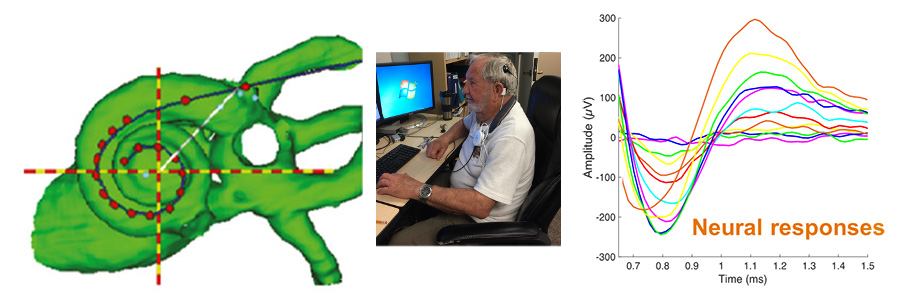Current Projects
Please fill out this research interest form or contact us if you are interested in volunteering as a research participant in our studies!
Biomarkers of Auditory Hypersensitivity
Our current project topic in this area focuses on sound sensitivity in autistic and non-autistic adults. Click here for more information about this project!
This project is funded by the Department of Defense Congressionally Directed Medical Research Program (Autism Research Program).
Auditory hypersensitivity refers to a range of sound tolerance problems that can include excessive loudness perception, negative emotional reactions to sound (e.g., fear, annoyance), and physical pain. Many children and adults experience symptoms of auditory hypersensitivity including those who have normal hearing, hyperacusis, tinnitus, autism spectrum disorder, migraine, and PTSD.
Projects in this research area focus on understanding how neural activity within and outside the auditory system contributes to auditory hypersensitivity across diverse groups of children and adults. We also seek to understand how loudness perception and emotional sound processing change across the lifespan and as a consequence of hearing loss.
We incorporate a variety of techniques including questionnaires, neuroimaging (EEG), eye-tracking, skin conductance measures, heart rate measures, and behavioral hearing tests. The primary goal of this work is to develop improved clinical tools for evaluating and treating auditory hypersensitivity.
Current Funding: Department of Defense Congressionally Directed Medical Research Program Autism Research Program (PI: Jahn), National Institutes of Health National Institute on Deafness and Other Communication Disorders (PI: Jahn), ASHFoundation New Investigators Research Grant (PI: Jahn), ASHA Students Preparing for Academic Research Careers Award (PI: Kashiwagura; Mentor: Jahn), Jerger Research Fellowship in Audiology (PI: Kashiwagura; Mentor: Jahn).


Understanding the Lived Experience of Hyperacusis and Clinical Practices in the United States
Audiologists and other healthcare professionals receive little education on how to diagnose and manage hyperacusis. Through surveys and virtual focus groups, we hope to develop a better understanding of the lived experience of hyperacusis, and common clinical practices for its diagnosis and management in the United States. This work will guide the development of diagnostic tools and treatments by considering the experiences of key stakeholders including patients, families, and healthcare professionals.
Visit the following links for current research opportunities:
- Fully virtual study for adults with pain hyperacusis (noxacusis) – in the analysis phase…check back soon for new opportunities
- Fully virtual study for parents of children who experience sound sensitivity (hyperacusis)
Improving Outcomes for Individuals With Cochlear Implants
Cochlear implant (CI) studies in our lab focus on identifying factors that influence CI benefit in children and adults. Current projects measure emotional responses to sound, sound-induced arousal, and listening effort and fatigue. Our ultimate goal is to apply information about perception, physiology, and patient demographics to develop personalized clinical interventions.
Visit the following links for current CI research opportunities:
- In-person study for adults with CIs – This study explores the emotional responses to speech and environmental sounds in cochlear implant users. If you wear a cochlear implant, please fill out this eligibility survey to participate in the study!

- Fully virtual study on listening effort and fatigue for adults with CIs – This study is surveying adults with cochlear implants to understand relationships between fatigue, speech perception, and device use. If you wear a cochlear implant, please consider completing our online questionnaires to help us understand more about listening fatigue and effort in individuals with cochlear implants. Please click this link to fill out the eligibility form!

- Fully virtual study on listening effort and fatigue for children with CIs and their parents – This study is surveying children with cochlear implants and their parents to understand relationships between fatigue, speech perception, and device use. If you have a child who wears a cochlear implant, please consider completing our online questionnaires to help us learn more about listening fatigue in children. Please click this link to fill out the eligibility form!

Current Funding: ASHA Advancing Academic Research Careers Award (PI: Jahn), Jerger Research Fellowship in Audiology (PI: Bhatarai; Mentor: Jahn), Texas Speech-Language-Hearing Foundation Research Grant (PI: Bhatarai; Mentor: Jahn)

Professional Issues in Communication Sciences and Disorders
We use surveys and focus groups to understand and improve various aspects of our profession. Current projects focus on gender-related barriers in communication sciences and disorders (CSD), interprofessional collaboration between audiologists and mental health professionals, and improving scientist-clinician education (e.g., AuD/PhD, and MS/PhD).
If you are a trainee or professional in the CSD or mental health fields, please consider taking 5-10 minutes to complete our current surveys!
Visit the following links for current research opportunities:
- Fully virtual study for mental health professionals
- Fully virtual study for scientist-clinicians and those pursuing dual-degrees in the CSD field (e.g., AuD/PhD, MS/PhD) – check back soon for more opportunities
- Fully virtual study on gender bias for professionals and trainees in communication sciences and disorders (all genders invited!)
